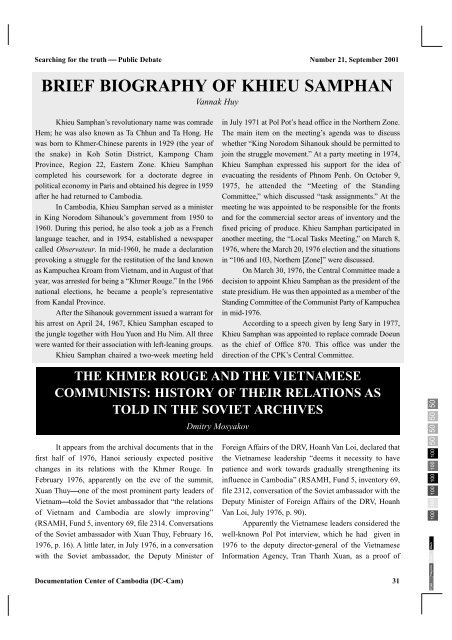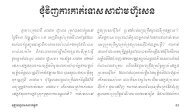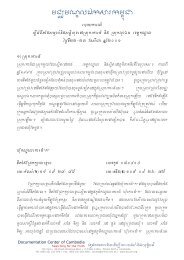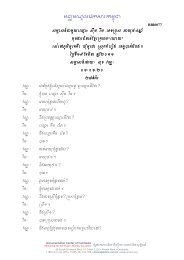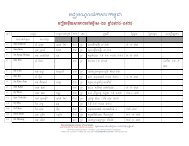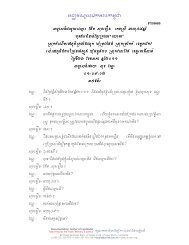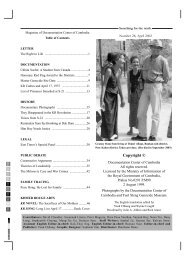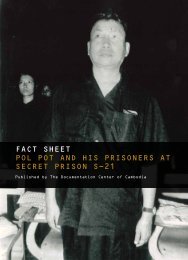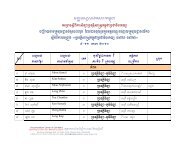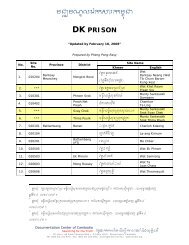Searching for the truth Issues 21 - Documentation Center of Cambodia
Searching for the truth Issues 21 - Documentation Center of Cambodia
Searching for the truth Issues 21 - Documentation Center of Cambodia
Create successful ePaper yourself
Turn your PDF publications into a flip-book with our unique Google optimized e-Paper software.
<strong>Searching</strong> <strong>for</strong> <strong>the</strong> <strong>truth</strong> ⎯ Public Debate<br />
<strong>Documentation</strong> <strong>Center</strong> <strong>of</strong> <strong>Cambodia</strong> (DC-Cam)<br />
Number <strong>21</strong>, September 2001<br />
BRIEF BIOGRAPHY OF KHIEU SAMPHAN<br />
Vannak Huy<br />
Khieu Samphan’s revolutionary name was comrade<br />
Hem; he was also known as Ta Chhun and Ta Hong. He<br />
was born to Khmer-Chinese parents in 1929 (<strong>the</strong> year <strong>of</strong><br />
<strong>the</strong> snake) in Koh Sotin District, Kampong Cham<br />
Province, Region 22, Eastern Zone. Khieu Samphan<br />
completed his coursework <strong>for</strong> a doctorate degree in<br />
political economy in Paris and obtained his degree in 1959<br />
after he had returned to <strong>Cambodia</strong>.<br />
In <strong>Cambodia</strong>, Khieu Samphan served as a minister<br />
in King Norodom Sihanouk’s government from 1950 to<br />
1960. During this period, he also took a job as a French<br />
language teacher, and in 1954, established a newspaper<br />
called Observateur. In mid-1960, he made a declaration<br />
provoking a struggle <strong>for</strong> <strong>the</strong> restitution <strong>of</strong> <strong>the</strong> land known<br />
as Kampuchea Kroam from Vietnam, and in August <strong>of</strong> that<br />
year, was arrested <strong>for</strong> being a “Khmer Rouge.” In <strong>the</strong> 1966<br />
national elections, he became a people’s representative<br />
from Kandal Province.<br />
After <strong>the</strong> Sihanouk government issued a warrant <strong>for</strong><br />
his arrest on April 24, 1967, Khieu Samphan escaped to<br />
<strong>the</strong> jungle toge<strong>the</strong>r with Hou Yuon and Hu Nim. All three<br />
were wanted <strong>for</strong> <strong>the</strong>ir association with left-leaning groups.<br />
Khieu Samphan chaired a two-week meeting held<br />
in July 1971 at Pol Pot’s head <strong>of</strong>fice in <strong>the</strong> Nor<strong>the</strong>rn Zone.<br />
The main item on <strong>the</strong> meeting’s agenda was to discuss<br />
whe<strong>the</strong>r “King Norodom Sihanouk should be permitted to<br />
join <strong>the</strong> struggle movement.” At a party meeting in 1974,<br />
Khieu Samphan expressed his support <strong>for</strong> <strong>the</strong> idea <strong>of</strong><br />
evacuating <strong>the</strong> residents <strong>of</strong> Phnom Penh. On October 9,<br />
1975, he attended <strong>the</strong> “Meeting <strong>of</strong> <strong>the</strong> Standing<br />
Committee,” which discussed “task assignments.” At <strong>the</strong><br />
meeting he was appointed to be responsible <strong>for</strong> <strong>the</strong> fronts<br />
and <strong>for</strong> <strong>the</strong> commercial sector areas <strong>of</strong> inventory and <strong>the</strong><br />
fixed pricing <strong>of</strong> produce. Khieu Samphan participated in<br />
ano<strong>the</strong>r meeting, <strong>the</strong> “Local Tasks Meeting,” on March 8,<br />
1976, where <strong>the</strong> March 20, 1976 election and <strong>the</strong> situations<br />
in “106 and 103, Nor<strong>the</strong>rn [Zone]” were discussed.<br />
On March 30, 1976, <strong>the</strong> Central Committee made a<br />
decision to appoint Khieu Samphan as <strong>the</strong> president <strong>of</strong> <strong>the</strong><br />
state presidium. He was <strong>the</strong>n appointed as a member <strong>of</strong> <strong>the</strong><br />
Standing Committee <strong>of</strong> <strong>the</strong> Communist Party <strong>of</strong> Kampuchea<br />
in mid-1976.<br />
According to a speech given by Ieng Sary in 1977,<br />
Khieu Samphan was appointed to replace comrade Doeun<br />
as <strong>the</strong> chief <strong>of</strong> Office 870. This <strong>of</strong>fice was under <strong>the</strong><br />
direction <strong>of</strong> <strong>the</strong> CPK’s Central Committee.<br />
THE KHMER ROUGE AND THE VIETNAMESE<br />
COMMUNISTS: HISTORY OF THEIR RELATIONS AS<br />
TOLD IN THE SOVIET ARCHIVES<br />
It appears from <strong>the</strong> archival documents that in <strong>the</strong><br />
first half <strong>of</strong> 1976, Hanoi seriously expected positive<br />
changes in its relations with <strong>the</strong> Khmer Rouge. In<br />
February 1976, apparently on <strong>the</strong> eve <strong>of</strong> <strong>the</strong> summit,<br />
Xuan Thuy⎯one <strong>of</strong> <strong>the</strong> most prominent party leaders <strong>of</strong><br />
Vietnam⎯told <strong>the</strong> Soviet ambassador that “<strong>the</strong> relations<br />
<strong>of</strong> Vietnam and <strong>Cambodia</strong> are slowly improving”<br />
(RSAMH, Fund 5, inventory 69, file 2314. Conversations<br />
<strong>of</strong> <strong>the</strong> Soviet ambassador with Xuan Thuy, February 16,<br />
1976, p. 16). A little later, in July 1976, in a conversation<br />
with <strong>the</strong> Soviet ambassador, <strong>the</strong> Deputy Minister <strong>of</strong><br />
Dmitry Mosyakov<br />
Foreign Affairs <strong>of</strong> <strong>the</strong> DRV, Hoanh Van Loi, declared that<br />
<strong>the</strong> Vietnamese leadership “deems it necessity to have<br />
patience and work towards gradually streng<strong>the</strong>ning its<br />
influence in <strong>Cambodia</strong>” (RSAMH, Fund 5, inventory 69,<br />
file 2312, conversation <strong>of</strong> <strong>the</strong> Soviet ambassador with <strong>the</strong><br />
Deputy Minister <strong>of</strong> Foreign Affairs <strong>of</strong> <strong>the</strong> DRV, Hoanh<br />
Van Loi, July 1976, p. 90).<br />
Apparently <strong>the</strong> Vietnamese leaders considered <strong>the</strong><br />
well-known Pol Pot interview, which he had given in<br />
1976 to <strong>the</strong> deputy director-general <strong>of</strong> <strong>the</strong> Vietnamese<br />
In<strong>for</strong>mation Agency, Tran Thanh Xuan, as a pro<strong>of</strong> <strong>of</strong><br />
31<br />
100 100 100 100 100 100 50 50 50 50<br />
Black<br />
Yellow<br />
Magenta<br />
Cyan


